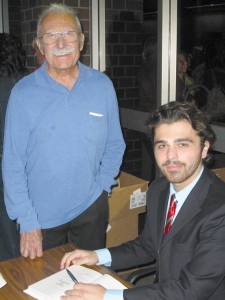Ruzan Orkusyan
Staff Writer

Photo: Barlow Der Mugrdechian
The dark echoes of the past hypnotized the audience as a powerful voice told stories from a Family of Shadows on Monday, October 18. Generations of hardworking and persistent Armenians emerged to retell the stories of their troubled lives. All the juicy details were saved, of course, for the book, and only so much was exposed by the author, Garin Hovannisian, to heighten curiosity and making the audience thirst for more.
The lecture by Hovannisian, a third generation American-Armenian who divides his time between America and Armenia, was sponsored by the Armenian Studies Program. The powerful voice of the author resonated through the hall, touching everyone’s hearts. Passionately, impressively, Hovannisian revealed the major plots of his first novel, explaining at each turn the history of his family, more specifically that of his great-grandfather, grandfather, and father, each of whom played a significant role in the Armenian Diaspora.
Hovannisian delved into the delicate topic of murder, memory, and the Armenian-American Dream that his ancestors constantly strove for, paying tribute to generations of Hovannisians and their hard work in order to attain a successful life. He revealed bits and pieces of his story of immigration, struggle, and the journey home – a story all too familiar for many Armenians. This ability to universalize his own family story was the key component, making the lecture and consequently the book, easier to relate to and more personal. Family of Shadows begins with the story of Garin’s great-grandfather, Kaspar Hovannisian, who is forcefully separated from his mother and brother, torn away from his homeland, and scarred by the screams of his mother and neighbors, as they are all “relocated” in 1915 by the Turks. The novel describes the toils and troubles Kaspar faces as a young adolescent trying to survive the atrocities and changes occurring in Western Armenia.
After arriving in Tulare in the San Joaquin Valley, Kaspar Hovannisian settled down with his wife Siroon, and children John, Ralph, Richard, and Vernon. He bought his own farm and endeavored to make a name for himself. From this point the story largely follows Kaspar’s younger son, Richard, who seems to be different from the rest. He’s a dreamer, a man destined for greatness as a scholar.
Richard Hovannisian inherited great patriotism and pride for his Armenian past, traveling as far as the Jemaran in Beirut for an entire year in order to learn the Armenian language. Richard struggles with his identity – a struggle passed down from generation to generation – as he strives to make Armenia known, to make Armenian studies a part of American education.
Yet again, the story shifts focus to Richard’s oldest son, Raffi, a dreamer and ardent patriot just like his father. We see Raffi’s early leadership and involvement in politics and social activities, which later translated into major accomplishments not only in America, but also in Armenia. Raffi Hovannisian fell in love with Armenia, and the more he and his wife Armenouhi contemplated the past, the more they were captivated by a rapidly changing Armenia. So much so that after the earthquake of 1988 they moved to the capital of Yerevan, and after the fall of the Soviet Union in 1991, Raffi Hovannisian was appointed the first Foreign Minister of the new Republic of Armenia.
Garin Hovannisian masterfully combines the history of the Armenian Genocide and Armenia under Soviet rule with the personal, secret stories of his family. The plots intertwine to tell a spellbinding story of identity, home, and passion that can lead a man to greatness.
Despite the apparent success of the novel Garin pessimistically remarks that this work is “ambitious” and “very likely to fail.” No matter, for him, as for many in the audience, the novel was a sort of “pilgrimage” to the past, a spiritual awakening. The older members of the audience recalled their own past. One audience member commented on how he had graduated from the Jemaran of Beirut in 1950 and during the lecture he felt as if Simon Vratzian himself were standing in the hall.
Young and old, American and Armenian were overjoyed and deeply touched by the interesting, thoughtful, and articulate lecture.
 Hye Sharzhoom Armenian Action
Hye Sharzhoom Armenian Action